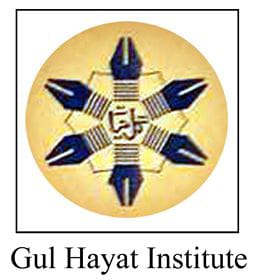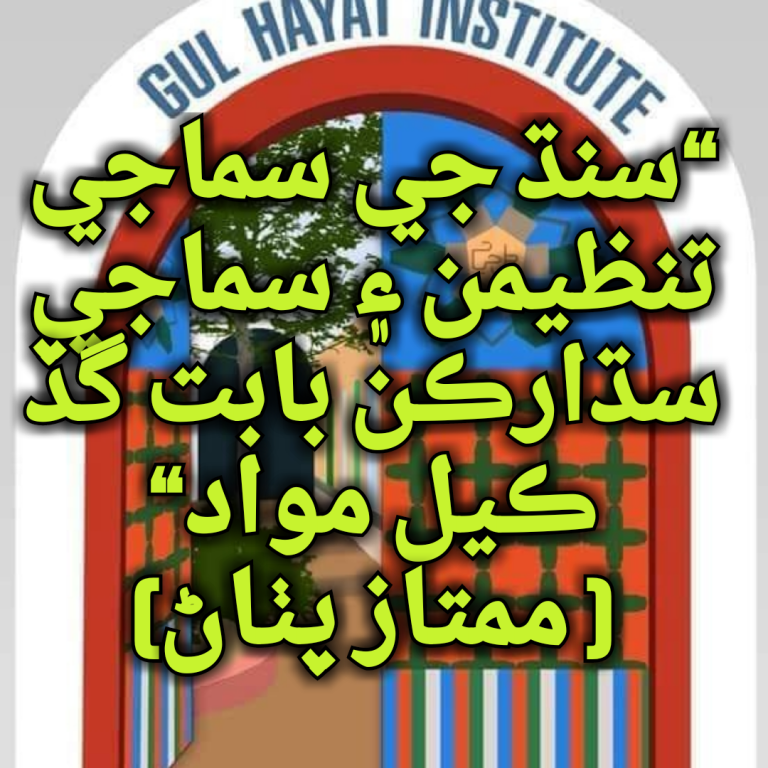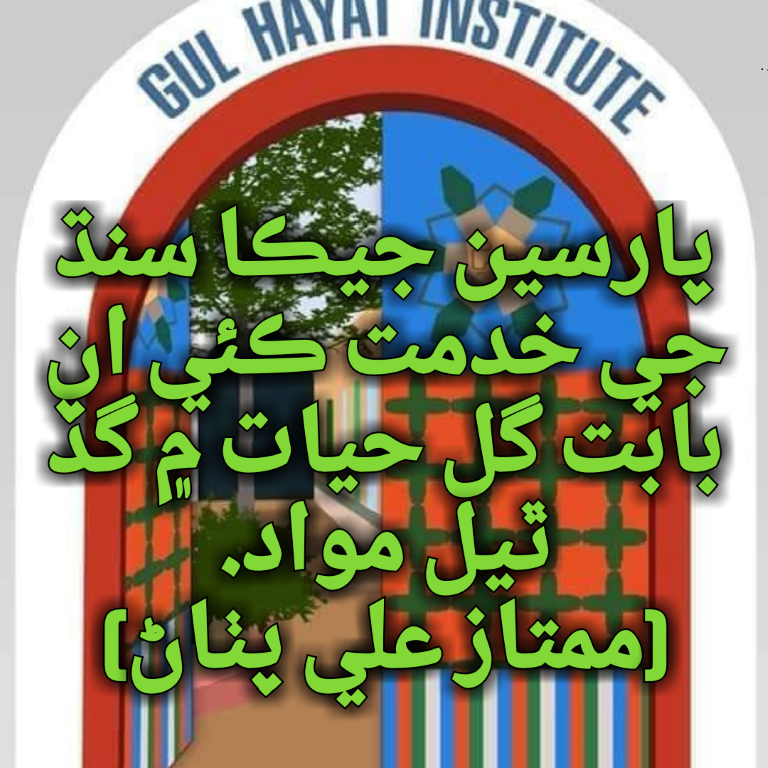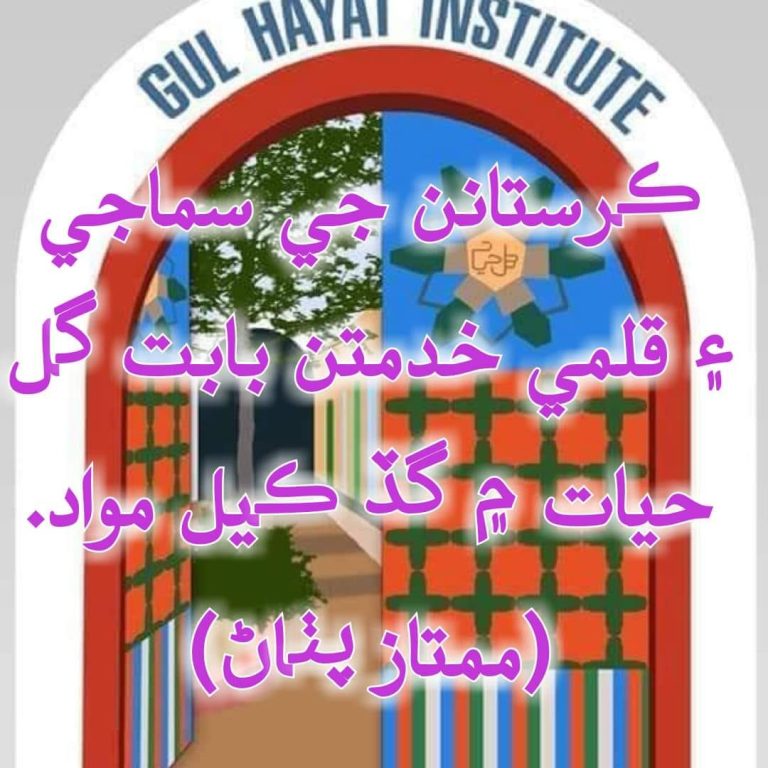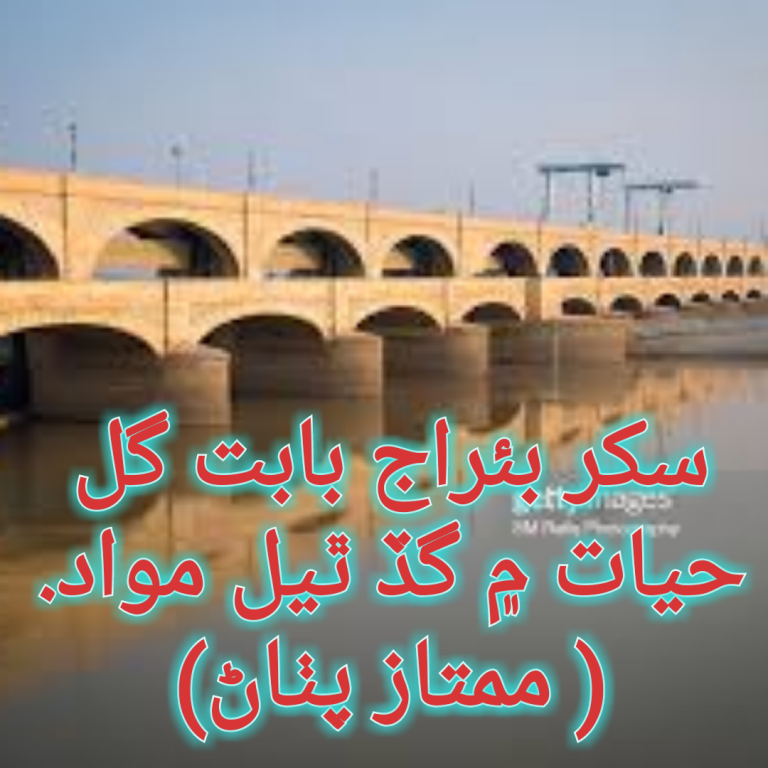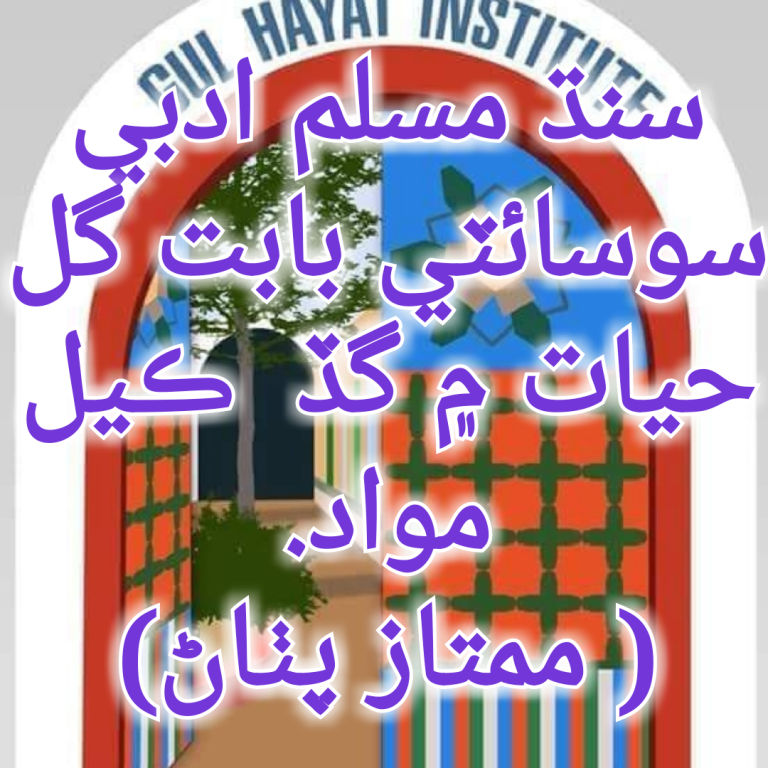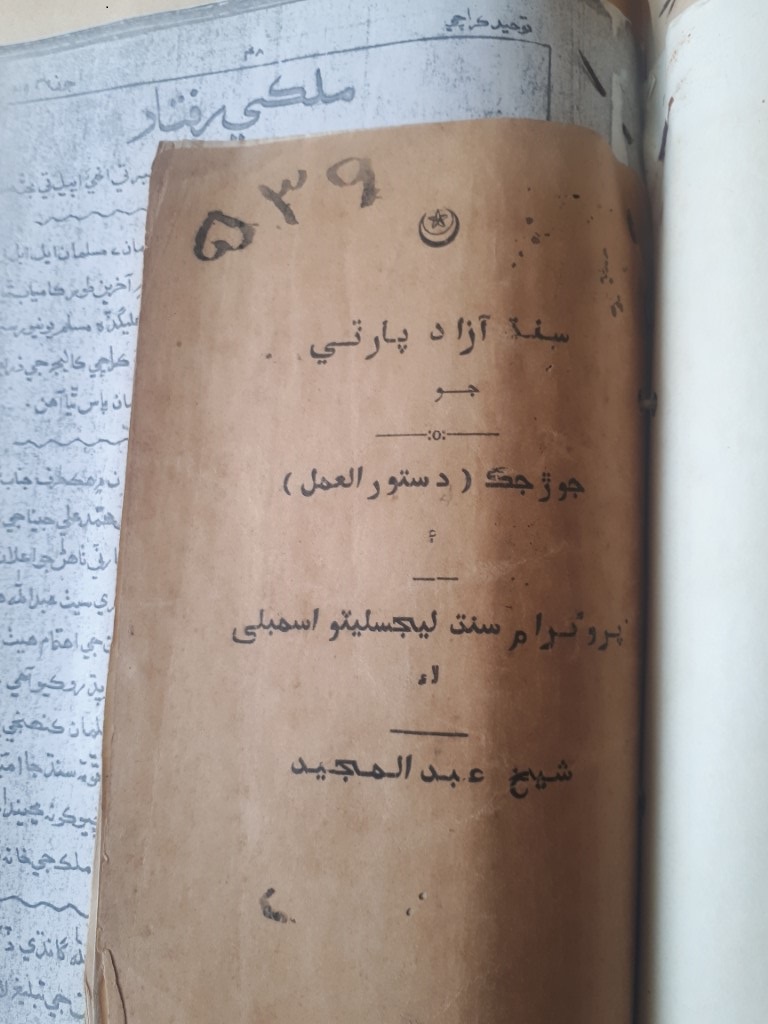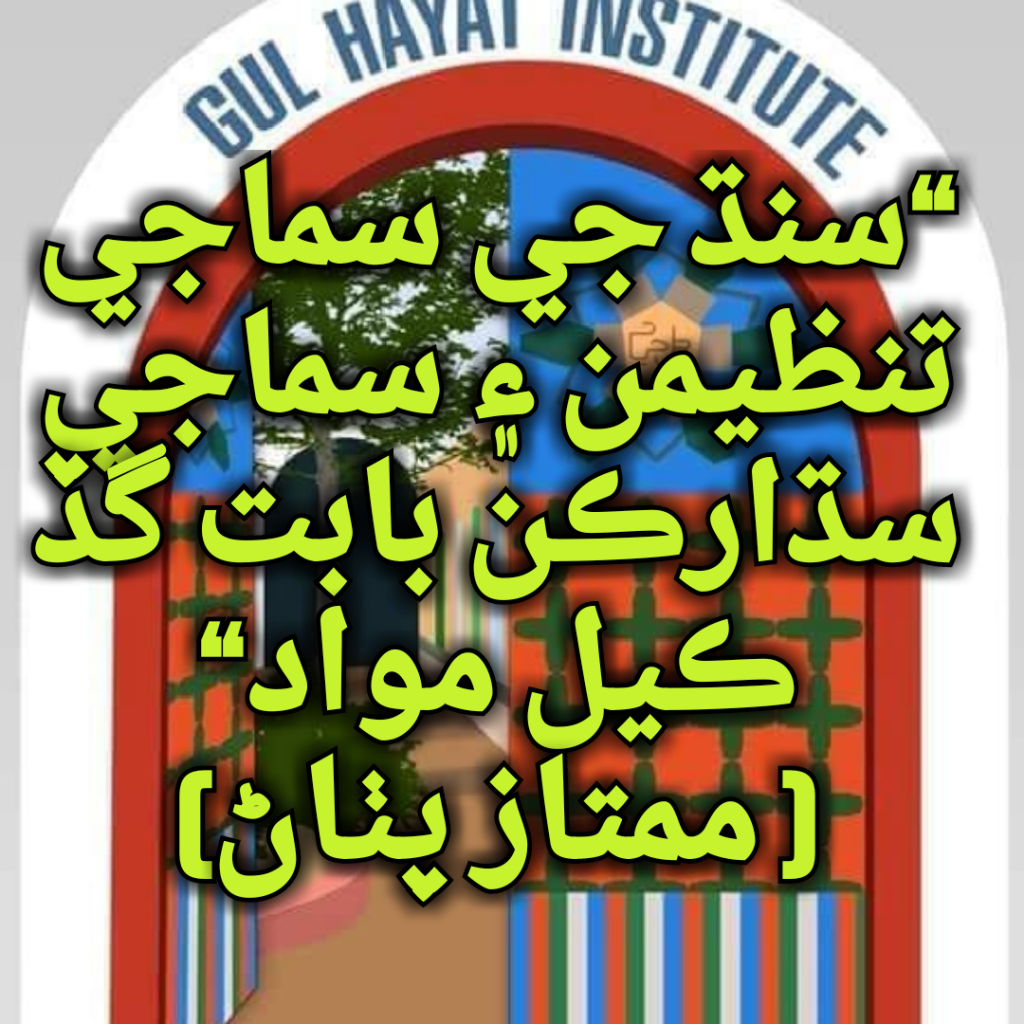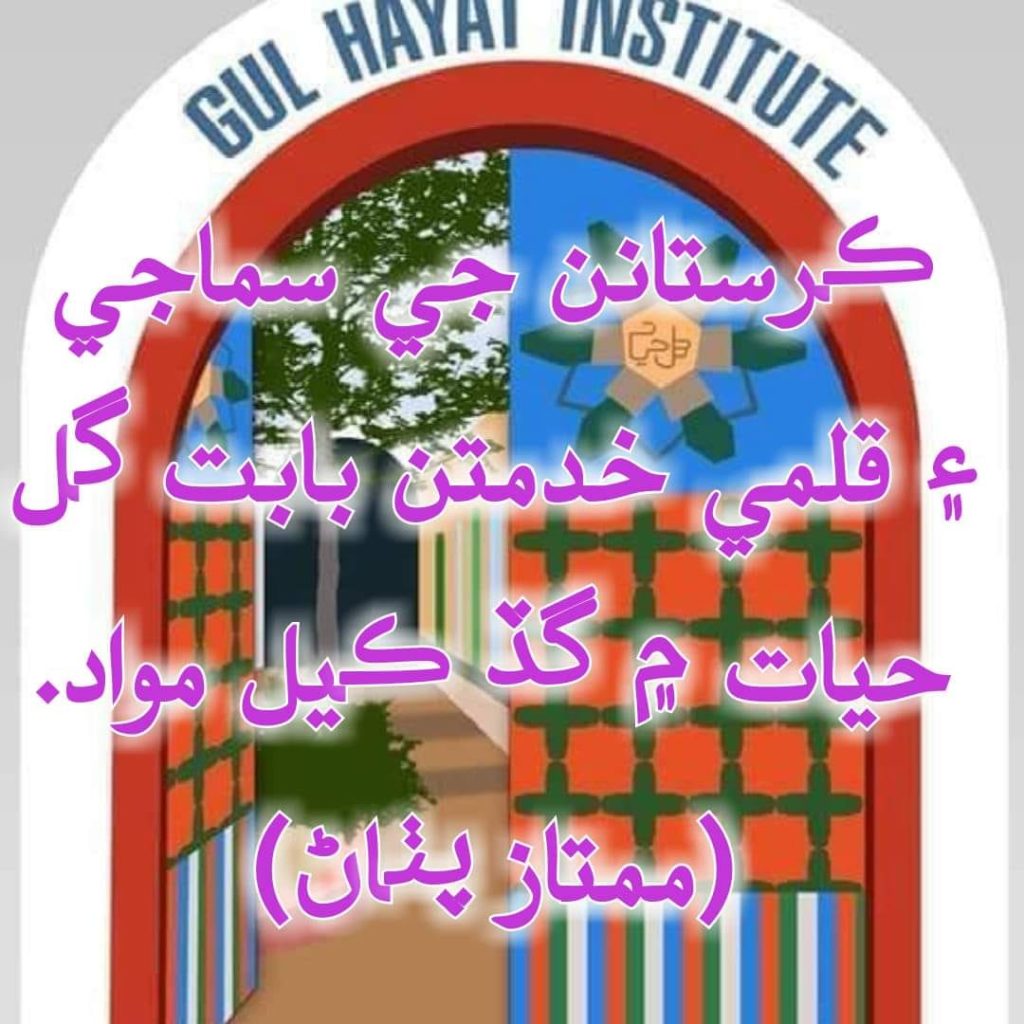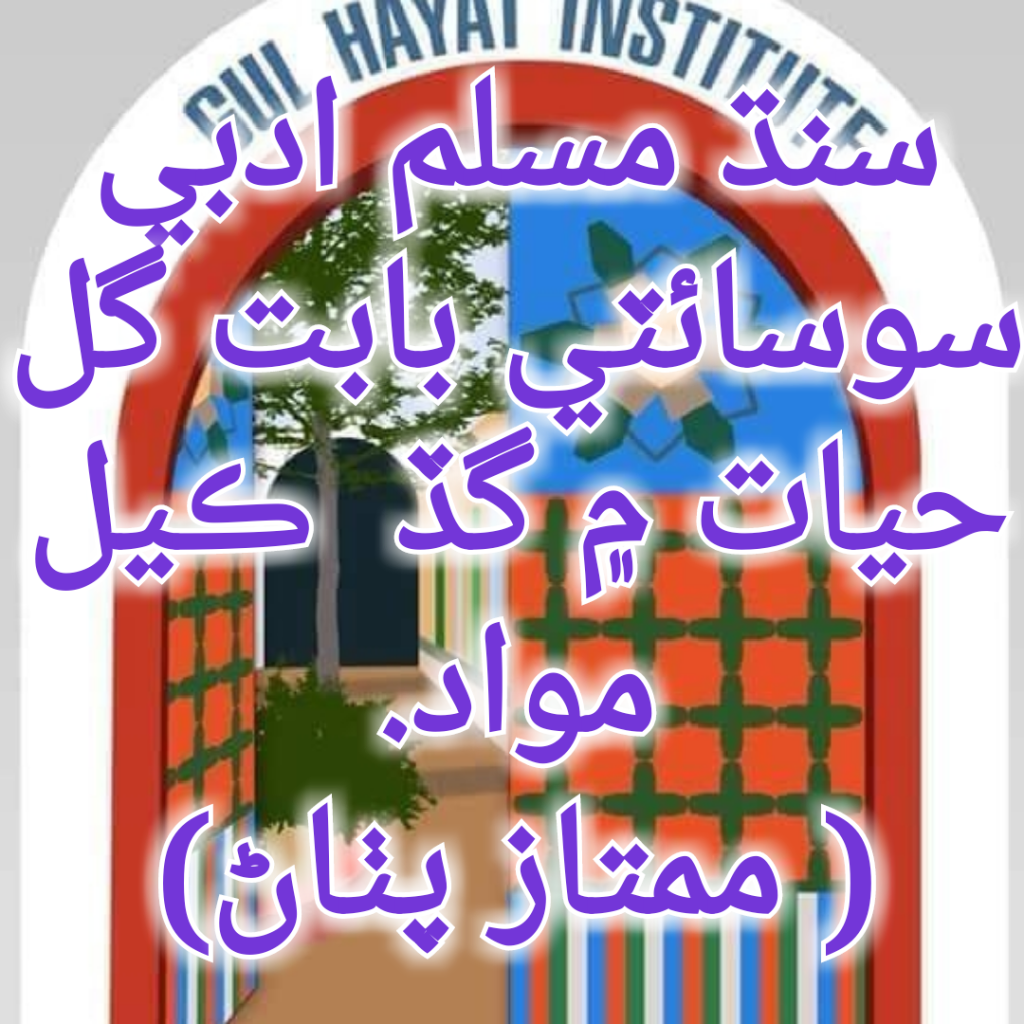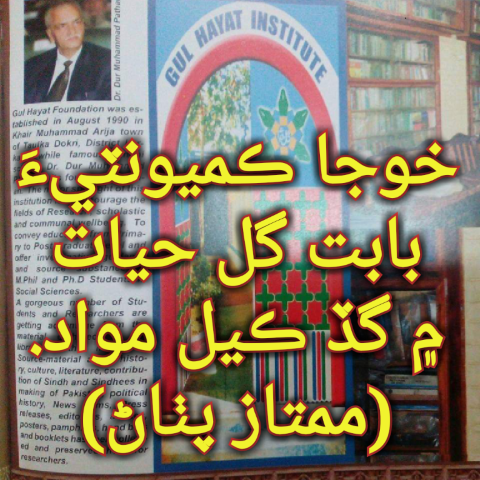APRIL BIRTH DATES
1st April
KhalifoGul Muhammad ‘Gul’ (Hala/Poet/1811), Muhammad Sidiqui ‘Musafir; (TandoBago/Educationist & Poet/1879), BhojrajNagrani (Hyderabad >Mombai/Educationist & Writer/1903), Syed Ghulam Mustafa Shah (Sujawal/Ex V.C & Federal Minister/1918),TolaramSotehar (Thar/Poet/1919), BhagwanPushp (Hyderabad >Mombai/Writer/1922), Arbab Ali ‘Musafir’ (Poet/1925), Umaruddin ‘Bidar’ (Journalist & Poet/1929), NazirTukhrai (Poet/1930),NiazHamayoonvi (Poet/1930), Amir Bux ‘Nazar’ (Jahan Khan Almani/Poet/1933), NasirBrohi (Karachi/Journalist/1937), NasirMorai (Moro/Writer/1937), Muhammad Khan Larik ‘Ghareeb’ (BaharoLarik/Folklore Poet/1937), UmirdarazAbassi (Haji Dhdhro /Local Politician/1938),Ali Anwar Shah ‘Ajmal’ (Talho/Poet/1940), Dr.Bashir Ahmad ‘Shad’ Pathan/Shikarpur>Larkano/Poet & Scholar/1942), Muneer Ahmad Chandio (BeroChandio> Karachi/Founder of SIK PRET/Social Worker, & Writer/1943),Dr.Bashir Ahmad Shaikh (Shikarpur/Ex-V.C/1944), SachalSarfai (Motani/Journalist/1945),Abdullah Khan Jissar (Lalia/Adab Dost/1946), GhulamNabi ‘Naz’ Bhatti (Poet/1946), Abdul KarimTalpur (Writer/1947), Dr.BadaruddinUjan (Shikarpur/ & Retired Officer & Scholar/1947),Muhammad Khan Siyal (Syed Ibrahim Shah/Journalist/1949), Aziz Brohi (Writer/1950), Allah BachayoMemon (Hala/Retired Officer & Writer/1950) Azizullah ‘Aziz’ (RasoolBux/Poet/1950), ,LiaquatRajpar (Larkano/Writer/1952), Muhammad UsmanMemon (Bubak/writer/1952), Muhammad Yamin ‘Ghamghen’ (Kando Babur/Poet/1953), LiaquatMagsi (Gul Muhammad Magsi/Writer/1953), RasoolBux ‘Tamimi’ (Jati/Poet/1953),WaqarNathanshahi (Poet/1953), GhulamNabiDipar (Writer/1957), AsadKhati (Poet/1957), Abdul JabbarMemon (Shikarpur/Journalist/1957), Muhammad ParyalMarri (shikarpur/Journalist/1957), AtiaDaudLarik (MolidinoLarik/Poetess & Feminist/1958),NiazHussain (Tayab/Journalist/1958), ShabirBedar Bhutto (sukkur/Jornalist/1959), ImdadSarwari (Arazi/Poet/1959), Abdul Nabi ‘Aseer’ (SobdarSargani/Poet/1959), Noor-u-NisaMemon (Writer/1960), RasmiAsoni Kumar (Devlali/Poetess/1960), Dr. Anwar ‘Figar’ Hakro (Shikarpur/Reseach Scholar/1961), QurbanMangi (Khairpur/Writer & Publisher/1961), MazharHajano (Shikarpur/Journalist/1962), Muneer-u-din ‘Roshan’ (Kotri/Poet/1962),RazakSahito (Karachi/Poet/1962), Sami Ahmad ‘Sami’ (Poet/1963),Sikandar ‘Raz’ Baloch (Shikarpur/Poet/1963), Allah Dino ‘Udasi’ Lakhr (SobhoMagsi /Poet/1963), BashrMangi (Writer/1963), FaqirGhulam Mustafa (Rasoolpur/Poet/1963), Sami SajidJunijo (Nimsharif/Poet/1963), MahbatiMalah (SalihPanhwar/Poet/1964), SikandarMagsi (Ghotki/poet/1964), JawaidSoomro (Hyderabad/Journalist/1966),NabiBux ‘Naz’ (KaqiFatih Muhammad/Poet/1966),FazalQadirMemon (Old Hala/Human Rights Activist/1966), Iqbal Ahmad Chandio (ValidadChandio/Journalist/1967),’Jani’ IshaqMalah (Rahim Malah/Poet/1967), YasirBozdar (Bozdar Wada/Poet/1967), ShazadoSitai (Rambko/Poet/1967), Noor HussainKalhoro (San ghar/Writer/1968) BewasBahar (shikarpur/Poet/1968),Amin Bhutto (Poet/1968), ,Abdullah Chandio (Khair Muhammad Chandio/Journalist/1968), NabiBux ‘Naz’ (Matli/Poet/1968), ManzoorAbro (Panwari/Poet/Child Literature Promoter/1969), RasheedKhanwahi (Poet/1959), GulsherLochi (Khan Wahan/Writer/1970), NaimatSoomro (MirpurBuriro/Writer/1970), Imran Soomro (Dadu/Writer/1970),KhawarQaboolai (Larkano/Poet/1971), Abdul RehmanRahujo (Rahuja/Journalist/1972), DadanSandelo (Dad Laghari/Poet/1972),DadanSandilo (Ghotki/Poet/1972), Muhammad SalihKhoso (Shahdadkot/Journalist/1972), Dilshad Bhutto (Saeed Khan Bhutto/Journalist/1972),FayazLatif (Larkano/Poet & Scholar/1972), Shafi Muhammad ‘Shad’ (PuranoTharo/Poet/1973), QadirJagerani (Meval Khan/Poet/1973), AyazRizvi (Abbas Shah/Poet/1973), ZulfiqarBughio (Karani/Journalist/1973), Dlip Kumar Ood (Mithodero/Writer/1973), AamirFarooq (GahiMahesar/Writer/1974), Ali Muhammad Abro (Gaheja/Folklore Poet/1975),’Wafa’ Buriro (Jacobabad/Poet/1975), MaqboolKhaskheli (Khairpur/Poet/1977), Ayaz Amar Memon (Fatih Muhammad/Poet/1978), ZulfiJamali (Haji Qasim/Writer/1979), AftabLashari (Ghotki/Writer/1979), Abdul Basit Bhutto (Banguldero/Social Worker & Writer/1980), ImdadJiskani (Poet/1981), Ghulam ‘Aadarsh’ (MureedHussain/Poet/1982), ‘Udas’ Premi Bhutto (MakhdoomBilawal (Poet/1986).HabibullahChandio (Poet/1989),SarangChandio (Poet/1991), MaheenHisbani and Wahid Paris Hisbani.
2nd April
Syed Ali Gohar Shah Sani (Pir Jo Goth/Saint/1860), Khatanmalalies Swami Tilokdas (Abdo/Poet and Political Activist/1905), Mangharam ‘Dayal’ (Poet/1920), FaizHydri (TandoHyder/Poet/1922),Dr.ShamsuddinUrsani (Hyderabad/Research Scholar/1939), GhulamRasool ‘Ghulam’ Jatoi (SttardinoSangi/Poet/1942), AyazPatoli (Tando Muhammad Khan/Writer/1944), Muhammad Ali Siddiqui (Shikarpur/Journalist/1948),AijzAbro (KolabJeal/Poet/1958), Muhammad AkramAraen (Writer/1959), Sufi Khan Muhammad Gadahi (Khushhalani/Poet/1960), ZafarAbbasi (Kandyaro/Writer/1964),’Aasi’ AltafHussain (Bhai Khan Palh/Poet/1973), PunhalMemon (Karra/Poet/1976),Fatah AmjadBajkani (Tangwani/Poet/1978), Iqrar Danish (Syedpur/Poet/1983), MithoBheel (Sanghar/Poet/1984), ‘Aajiz’ Abro (KolabJeal/Poet/1985),
3rd April
MoulanaSanaullah ‘Sanai’ (DhoraiSihra/Poet/1895), PirbhdasVerwani (Hala/Ajmir/Writer/1900),ChelaramAatmaram (Mithiani>Ajmir/Writer/1929), YousifShaheen (Ex-Senator, Journalist & Founder Daily Barsat/1939), Abdul Latif ‘Udasi’ Soomro (Shikarpur/Poet/1954), Muhammad SalihMemon (Umar Memon/Journalist/1964), MasoomBukhari (MarzoJanwri/Poet/1968), Asadullah ‘Asad’ Solangi (Muhammad SulemanSolangi/Poet/1971), GulshanShaikh (Bihman/Journalist/1973), GhulamNabi ‘Ghulam’ Veesar (MeharVeesar/Poet/1976).
4th April
Moulana Din Muhammad ‘Wafai’ (Bhatyoon/ Religious Scholar, Freedom Fighter, Journalist, Poet & Scholar/1894), Khealdas ‘Fani’ (MianMuhib>Bhopal/Poet & Singer/1914), AanandAdwani (Karachi >Mombai/Actor/1921), ArjunsingBajlani (Khairodero>Poono/Poet & Singer/1921), ShaheedSoomro (Arazi/Writer/1933), Shabir ‘Hatif’ (Poet/1940), Dr.Arz Muhammad Unar (Allah Vasayo/Research Scholar/1942), Zahid Ali Magsi (Dadu/Writer/1942), ‘Ajiz’ Nathanshahi (KN.Shah/Poet/1946), Ghulam Muhammad ‘Dur’ (Piyaro Khan/Poet/1947), Dr.MumtazBukhari (Hala/Research Scholar/1947), Parkash ‘Deep’ (Ratodero/Poet/1949), Ghulam Mustafa Abbasi (Faridabad/Journalist/1950),DastagerBhatti (Eminent Journalist/1951) Syed Sabir Ali Shah (Shahdadkot/Journalist/1953), AzirMukhtyar (Poet/1957), Madanlal (Writer/1959), Dr.NoorHussainQadri (Sukkur/Research Scholar/1961), Mir Khan Jiskani (Jiskani/Writer/1972), IzharSoomro (Shikarpur/Journalist/1973),SaleemIndhar (IlyasIndhar/Poet/1947), ‘Mazloom’ Mangrio (Muhammad Amin/Poet/1977).
5th April
1. Moulana Ghulam Ahmad Malkani (Malkani/Religious Scholar & Freedom Fighter/1860), 2. Kirpal Sharma (Kotri -Ajmir/Freedom Fighter/1905), 3. Ibn Ilyas Soomro (Hyderabad/Writer/1925), 4. Ahmad Khan ‘Madhosh’ (Sultan Chandio/Poet/1931), 5. M.Ashraf Mansur (Tilty/Scholar/1932), 6. Amina Halepoto (Hyderabad/Educationist/1932), 7.Nand Hinduja (Larkano – Ulhasnagar/Writer & Stage Director/1937), 8. Aminullah Alvi (Shikarpur/Writer/1943), 9. Sajid Lalpuri (Jahanpur/Poet/1944), 10. Muhammad Khan ‘Masruf’ Mandhro (Golo/Poet/1953), 11. ‘Aajiz’ Sargani (Sobdar Sargani/Poet/1961), 12. Nadr Baloch (Shikarpur/Journalist/1965) 13. Mubin Wassan (Kandyaro Wassan/Writer/1965), 14. Shabir Laghari (Sher Laghari/Writer/1978 ), 15. Mushtaq Rind (Mir Rind/Writer/1984), 16. Wafa Khamiso Kumbhar (Jhudo/Poet/1987).
DEATHS: 1. Moulana Abdul Hakim Kandi waro (1838 ), 2. Dr. Earnest Trump (First ever Compiler and publisher of Shah Jo Risalo/1885), 3. Moulana Muhammad Qasim (Garhi Yasin/1931), 4. Khanchand Daryani (Dramatist/1954), 5. Mir Ali AhmadKhan Talpur (Hyderabad/Freedom Fighter & Minister in Zia regime/1987).s
6th April
1.Bhai Kalachand (Hyderabad/Singer & Social worker/1867), 2. Dr. Abdul Karim Sandilo (Mihrab Sandilo/Scholar/1919), 3. Dost Muhammad ‘Dost’ (Kotri/Poet/1936), 4. Rajib Gadahi (Saharo Khan/Folklore Poet/1958 ), 5. Allah Bachayo Paras (Kadhan/Journalist/1958 ), 6.Jani Jatoi (Qaim Jatoi/Poet/1984), 7. Manzoor Gul Bhangwar (Poet/1986).
7th April
1. Dr.N.B.G.Kazi (Rohri/Scholar/1923), 2. Vali Daudpoto (Poet/1927), 3. Dr. Ghulam Rasul Baloch (Hyderabad/Scholar/1935), 4. Agha Salim (Shikarpur/Writer/1937), 5. Rajesh Bhardwaj (Tando Adam/Singer/1947), 6. Mir Abdul Rasul ‘Mir’ (Mihar Ali/Poet/1950), 7. Fahmida Sharaf (Writer/1975), 8. Hamdard Soomro (Chowkhandi/Poet/1978 )
8th April
1. Gulan Solangi (Sadiq Solangi/Folklore Poet/1928 ), 2. Jamaluddin ‘Momin’ (Nawa Jaoti/Poet/1932), 3. MuhammadHassan Bhutto (Larkano/1938 ), 4. Khealdas Golani (Bilawalpur – Ulhasnagar/ Actor/1942), 5. Malik Nadim (Kandhakot/Scholar/1946), 6. M. Yaqub ‘Aarzo’ (Poet/1948 ), 7. Ghulam Mustafa Kandhro (Writer/1949), 8. M.Yaqub Laghari (Dighri/Journalist/1952), 9. ‘Gulzar’ Siyal (Thalho/Poet/1965), 10. M.Ayub Ansari (Kambar/Journalist/1952),11. ‘Naz’ Jokhio (Poet/1961), 12. Hidayat Depar (Wad Bhagia/ Writer/1970)
9th April
1. Sarla Devi (Shikarpur – Larkana/Social Worker/1915), 2. Wahdat Ali Naqrach (Poet/1934), 3. Dr.Vansimal Manghani (Hala – Ajmir/Freedom Fighter/1934), 4. Ishaq Rahi (Mehar/Poet/1935), 5. Ghulam Muhammad ‘Ghazi’ (Abdo/Poet/1955), 6. Vasdev Makhija (Ahmadabad/Actor/1957), 7. Abida Shaikh (Political worker/1960)
10th April
HasaramPamnani (Rohri/Social Worker & Freedom Fighter/1839), Ranjho Khan ‘Piyasi’ (Poet/1916), AzharRelai (DargahPirRakhyal Shah/Poet/1923), Jamal Abro (Fiction writer/1925), SoomarSoudai (Dadu/Poet/1938), MithalHyderi (Writer/1938), Agha Sanaullah (Shikarpur/Journalist/1948), Azizullah ‘Aziz’ Mahessar (QaziArif/Poet/1950), LaxmiJaswant Kumar (Mombai/Dancer/1955), TariqAlimAbro (Kamber/Artist/1958), Aziz Kaleri (Alan/Writer/1966), ShoukatArain (Sinjhoro/Journalist/1967), TemoorChandio (Nirah/Writer/1973),AsadChachar (PanoAqil/Poet/1978), RafiqMalgani (Ali Gohar/Writer/1979), Abdul Rasool ‘Abid’ Metlo (Ahmad Metlo/1980), WaheedGabol (MiralGabol/Poet/1984)
11th April
MumtazAwan (Shikarpur/Writer & Producer/1934), Fazul Ahmad Bachani (TandoAllahyar/Writer/1934), Arbab Sindhi (Warah/Political Activist/1947), KanayoSadhwani (Ahmadabad/Poet/1951), Asghar Ali Mangi (Dokri/Folklore poet/1960), Abdul MajeedMugheri (Writer/1960), GhazalaBachani (TandoAllahyar/Writer/1963), KausarHalai (Hala/Poet/1971), NazeerSarohi (Gambat/Poet/1986).
12th April
His Highness Mir Sobdar Khan (Hyderabad/Ruler/1802), Hafiz Muhammad ‘Ahsan’ Channa (Malkani/Poet & Journalist/1900), Ali BuxJamali (BachalMehar/Poet/1912), Moulvi Noor-u-ddin ‘Masroor’ (Religious Scholar & Poet/1918), PartabTanwani (Sultankot> Bhopal/Singer/1929), Dr.Asadullah Shah ‘Hussaini’ (Tukhar/Poet/1931), Shahnawaz ‘Musafir’ (Mehar/Poet/1937), BadarQureshi (Jacobabad > Karachi/Poet & Journalist/1941), Syed Zulfiqar Ali Shah Jamot (Matiari/Politician/1941), SardarQureshi (Journalist/1944), QaziKhizir Hayat (Radodero/ Writer & Artist/1945), Hayat Shah Bukhari (Hatri/Poet/1949),MushtaqBagani (Poet/1949), FahmidaBaloch (Jacobabad/Political Activist/1952), Arbab Ali ‘Adil’ Chohan (Shikarpur/Poet/1953), Abdul HameedShaikh (Larkano/Jornalist/1953), Aziz Akhund (Writer/1954), MuzaffarShaikh (Shikarpur/Journalist/1955), KhudaBuxAbro (Artist/1957), Sharif Soomro (Halani/Poet/1967), Younis ‘Hamdam; (Tando Muhammad Khan/Poet/1967), NabiBux ‘Naz’ Shar (Poet/1971), FarooqKhokhar (Athwal/Writer/1980), Mast Ali Gopang (GuhramGopang/Poet/1981).
13th April
Abdul Aziz Jokhio (Mal Mari/Writer/1917), ChandolalJaisinghani (Ratodero>Mombai/Writer/1919), Khalifo Muhammad Aqil (Politician/1925), QamarShahbaz (Nawabshah/Poet & Fiction writer/1938), MoloPamnani (Thatto> Baroda/Artist/1942), Mir Muhammad AslamMagsi (Shikarpur/Journalist/1958), Manzoor Ahmad ‘Bedar’ (Poet/1961), ShafqatHussain ‘Najfi’ (Shahdadkot/Journalist/1961), Abdul KarimAsadDahri (Umar Dahri/Journalist/1967), Ali Bahar Rind (Writer/1972).
14th April
Sardar Muhammad Yaqub (Khairpur/Minster for Khairpur state & President Sindh Muhammadan Association/1858), NawabGhabi Khan Chandio (GhabiDero/1881), TeckchandDewani (Hyderabad/Social Worker/1910), NevandramSoni (Shikarpur/Artist/1914), ChandolalJaisinghani (Ratodero>Mombai/1920), AhsanBadvi (Shikarpur/Writer/1925), Syed Madad Ali Shah ‘Manzar’ (Mahota/Poet/1942), PathanBurdi (Abdullah Burdi/Poet/1970), NaushadBhatti (Tando Muhammad Khan/Poet/1983)
15th April
Sufi Dost Muhammad ‘SajidSarshari’ (Karachi/Poet/1922), Ghulam Ali ‘Souz’ Khokhar (Poet/1924), IbnIlyasSoomro (Hyderabad/Poet/1925), Muharam Khan Shaikh (Writer & Professor/1928), Gurmukh ‘Gul’ (Hyderabad > Ahmadabad/Poet & Artist/1929), Amir Bux ‘Munir’ Nahyoon (Noor Muhammad/Poet/1936), KhushiramKhobchandani (Karachi > Hyderabad/Singer/1941), Sahib Khan Jalalani (Jalalani/Folklore poet/1949), KaziMaqsood ‘Gul; (Ratodero/Poet/1950),Agha Noor Muhammad Pathan (Shikarpur/Writer/ Director Academy of Letters, Sindh/1955), ManjhiZardari (Jam Zardari/Poet/1962), PushpaValabh (Mithi/Poetess/1963), NazirLaghari (DehVeesar/Journalist/1967), ManzoorBrhamani (Dadu/Writer/1967), KhadimMangi (Dodo Detho/Poet/1969), ‘Naji’ Noor Muhammad Pharro (Ali Muhammad Pharro/Poet/1972), JawaidSahir (Bubak/Journalist/1973), AsgharGago (Writer/1980),
16th April
KalachandKalyan (Hyderabad/Poet & Social worker/1867), Syed Anwar Ali Bukhari (Chak/Poet.1917), FatahullahSiddiqui (Sehwan/Writer/1943), Sultan Ahmad Abro (Dingro/Folklore poet/1944),Thadharan ‘Anparh’ (Gambat>Nandarbar/Poet/1946), MarviAlamAbro (Kambar/writer/1949), ‘Dukhi’ Daud (Shadn/Poet/1961).
17th April
HarilalBhawani (Educationist/1905), DeepchandarTilokchan Sharma (NausheroFeroz/Writer, Journalist & Freedom Fighter/1909), NabiBuxQazi (Rohri/Scholar/1923), Ahmad Khan ‘Gulzar’ (Poet/1927), AshiqArbani (Artist/1943),KamilSolangi (AbubakarSolangi/Writer/1950), Rajib Ali Samo (Larkano/Writer/1953), AmanullahBhatti (GarhiYaseen/Professor/1955), QadirBuxChanno (DhaniBux/Folklore poet/1960).
18th April
Moulvi Muhammad Halai (Religious Scholar/1860), R.B. KalomalPohomal (Hyderabad/Educationist/1877), AllamaI.I.Kazi (Paat/Philospher/1886), Haji HaqeerIbnMangan (Writer & Publisher/1901), PirGhulamHydera Shah (Politician/1910), LadharamGotam (Shikarpur> Ulhasnagar/Poet/1917), Rashed Ahmad Lashari (Poet/1922), ParpatiAdvani (Hyderabad >Mombai/Writer/1024), GhulamHussainRangrez (MirpurBathoro/Ex-Secretary General Sindhi AdabiSangay& Poet/1945), Mir Azam Ali Talpur (Tando Jam/Writer/1954), BarkatJeho (Chanbh/Poet/1967), Umed Sindhi (Dadu/Writer/1968), NiazJani (Shahdadpur/Artist/1970),SaqiJatoi (Saudi Arabia/Poet/1984)
19th April
Syed Hussan Shah MuradShirazi (Thatto/Saint/1418), BhojrajNagrani (Writer/1903),JagatAdvani (Hyderabad/Publisher & Writer/1913), GhanshyamMaghlani (Hyderabad >Ajmir/Journalist/1934), Gurmukh Bajaj (Larkano>Mombai/Musician/1937), DileepBachani (Ulhasnagar/Artist/1955), AzraJabeenMemon (Kotri/Writer/1955), Ali GoharAltafMalkani (Dadu/Writer/1967).
20th April
‘Saghar’ Sitai (Shwan/Poet/1920), Mohan Deep (Agro/Poet/1948), Akhlaq Ansari (Larkano/Writer/1957), Muhammad UsmanKumbhar (Haji Khan/Journalist/1960), Dr.FaizJunijo (SakherijaBhan/Poet/1963), MushtaqPhul (Talpur Wada/Secretary General Sindhi AdabiSangat/1966).
21st April
1.Mirza Ajmal Beg (Tando Thoro/Poet/1923), 2. Najaf Ali ‘Kamtar’ Naqvi (Poet/1923), 3. Atmaram Lalwani (Sukkur – Betol Ganj/Journalist/1924), 4. Abdul Khaliq Shaikh (Tharichani/Politician/1937), 5. Vishno Bhatia (Karachi – Mombai/Writer/1941), 6. Imdad Lashari (Malook Shah/Writer/1966).
22nd April
PirFazulHaq (Pir of Jhando/1927), Abdul Haq ‘Abid’ (Poet/1941),VaqarHanifMalah (Poet/1974).
23rd April
Hidayat Ali ‘Tariq’ (Lalu Rank/Poet/1860), Ahmad Khan ‘Akhtar’ (Bola Khan/Poet/1915),SaifMorai (Moro/Poet/1951), Haji Ali GulBuriro (Pir Jan Muhammad/Folklore Poet/1956), Jan Muhammad ‘Jan’ Khaskheli (Karam Khan/Poet/1956).
24th April
1.Moulana Mir Muhammad Naurangi (Religious Scholar & Freedom Fighter/1890),
2. Makhdoom Ghulam Hyder (Hala/Gadi Nashin & Politician/1899),
3. Mohan Dingra (Hyderabad – Mombai/Singer/1935),
4. Ali Nawaz ‘Naz’ Tunio (Poet/1947),
5. Syed Muhsan Shah Bukhari (Tando Muhammad Khan/Politician/1951)
6. Ashiq Amar Sitai (Poet/1965)
25th April
Syed Qadan Shah ‘Qadan’ (Amin Lakho/Poet/1927), Roopkumar ‘Kalakar’ (Sukkur> Ulhasnagar/Poet & Journalist/1932), Shaikh Muhammad Hajan (Professor & Scholar/1933), ShiyamSatwani (Hosri>Ajmir/Social Worker/1941), IshaqSoomro (Sakrand/Journalist & writer/1965), AijazSaif (Dadu/Writer/1966), YousifBahoto (Khan Jikoor/Poet/1969).
26th April
KumariVidur (Writer/1940), Benazir Malkani (Writer/1981).
27th April
‘Abid’ Aqli (Poet & Journalist/1907), HotchandHiranand (Writer/1909), RaghunUdaseen (Sukkur> Agro/Poet & Singer/1932), Dr.Anand Kumar (NausheroFeroz/Writer & Social worker/1941), Ram Tanwani (Dara Khan Mari >Bairagarah/Singer/1945).
28th April
Syed Abdul Rahman Sindhi (Religious Scholar/1740),GurdasGolani (Sohonagar> Ulhasnagar/Poet & Singer/1930), AtharMangi (VasoKalhoro/Poet & Producer/1948), Bashir Veesar (PunhoonVeesar/Poet/writer/1951), SaleemKorai (Larkano/Story writer/1954), KanjhimalChohan (Writer/1955), TahirMahzoon (Mehar/Poet/1985).
29th April
1. Roopchan Sipahimlani (Hyderabad – Ajmir/Journalist/1915),
2. Muhammad Bux ‘Johar’ (Hyderabad/Journalist &Writer/1919),
3. Mashkur Sargani (Sobdar Sargani/Poet/1960).
KalachandMirani (Hyderabad/Social worker & Singer/1857), SoofiJhamandas ‘Aashiq’ (Shikarpur/Poet & Journalist/1928), Wadhuram ‘Pushp’ (Shikarpur>Mombai/Poet & Juggler/1930), HarBhagwan ‘Nago’ (Nagpur/Singer/1952), RajkumarDaswani (Ajmir/Artist/1953), SikandarMallah (Sakrand/Poet/1963), RiazDahri (Umar Dahri/Poet/1973).
